
Cassava (
Manihot esculenta) has a positive effect on milk yield, researches show. [caption id="" align="alignnone" width="500"]
 Photo by willy_ochayaus
Photo by willy_ochayaus [/caption] Through the Philippine Council for Agriculture, Aquatic and Natural Resources Research and Development’s Science and Technology-based Farm Project (STBF), the value of cassava feed supplement in increasing milk production in dairy cows as well as the potential of cassava production as a livelihood option for the rural farmers have been validated. The cassava foliage is one of the non-conventional forage materials that has been proven to contain high levels of essential nutrients, specifically protein; and believed to prolong shelf life of milk. In the STBF, results of the Magsasaka Siyentista (MS) practice and the application of science and technology (S&T) interventions were compared. MS practice involved feeding milking cows with concentrates and improved grasses as forage. On the other hand, S&T practice included the MS practice with the addition of cassava foliage at 5 kg per day. In this comparison, five cows per practice were used.
More milk with longer shelf life During initial lactation, average milk production using S&T practice yielded 11.6 kg while MS practice produced 10.6 kg. At 100 days, 16.7 kg of milk was produced with the S&T interventions. With the MS practice, only 11.3 kg was recorded. Milk yield is anticipated to decrease during the middle stage of lactation. However, in the S&T practice, a slower decrease rate of 13.3% in milk yield was observed. In the MS practice, a 22.6% decrease in milk production was noted. The comparison showed that supplementing cassava foliage can increase milk production considerably during early lactation and slightly during the middle lactation. Aside from more milk, there was also slower lactic acid build up in the milk in the S&T practice. This can be attributed to increase in milk thiocyanate content, a factor that could possibly enhance quality and storage of milk (M. Wanapat, 2003). Cassava supplementation can prolong the shelf life of milk up to four hours.
Cassava equals cash Supplementing cassava foliage to milking cows gave higher income equivalent to milk production/cow per day of 3kg, 1.65 kg, and 0.80 kg at early (100 days), middle (200 days), and late lactation (300 days), respectively. This also means an additional income of P69.27/cow per day for early lactation, P36.32, and 17.57 for middle and late lactation, respectively. Since milk production naturally decreases toward the end of lactation, it is more beneficial to supplement with cassava foliage only from early until middle stage lactation. Furthermore, milk production of cows that are continuously supplemented until late lactation does not differ from that of cows on the MS practice.
Source: Business Diary Philippines



0 Comments